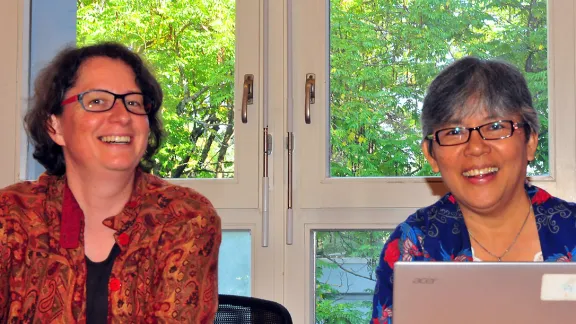
Rev. Dr Simone Sinn, LWF study secretary for Public Theology and Interreligious Relations, and Indonesian interfaith activist Rev. Elga Joan Sarapung. Photo: LWF/P. Mumia
LWF to submit findings at UN human rights review
(LWI) – Initiatives by young people in churches and mosques to protect each other’s places of worship against attacks by radicalized groups should not have to happen in a country with a constitution that guarantees freedom of religion, Indonesian interfaith activist Rev. Elga Joan Sarapung says.
Relations between religious groups in Indonesia are fragile and some religious communities are particularly susceptible to violence as they are threatened by radical and militant groups, Sarapung said at the Ecumenical Center in Geneva.
She presented the findings of a recent civil society report on freedom of religion or belief in Indonesia. In collaboration with the Lutheran World Federation (LWF), the report will be submitted to the United Nations human rights review of Indonesia in the coming days. The review is known as the Universal Periodic Review (UPR).
Sarapung, who is the director of the Institute for Interfaith Dialogue in Indonesia (Interfidei), in Yogyakarta explained that Interfidei works with civil society networks, including churches and other human rights organizations, to raise awareness of freedom of religion or belief in the country of 237 million.
Sarapung said one critical issue was that the government only officially recognizes six religions - Buddhism, Catholicism, Confucianism, Hinduism, Islam and Protestant Christianity. This discriminates against citizens who subscribe to other faiths, local religious traditions or are not religious.
“It is problematic when you are required to identify your religion on your identity card and on other official documents such as birth, marriage or death certificates,” she said.
Muslims are the majority in Indonesia, making up 87 percent of the population. While the constitution does not favor any particular religion, inconsistency between secular national laws and local sharia law in some predominantly Muslim areas exists, Sarapung said.
Houses of worship are often attacked or religious communities are evicted from their premises. Local governments fail to ensure the religious freedom of believers, she said.
Managing diversity and minimizing stereotypes
Interfidei’s work with youth, religious leaders and teachers focuses on managing diversity and minimizing stereotypes, prejudice and stigma in a multi-cultural and multi-faith society.
It encourages religious actors to stay faithful to their calling to be a blessing to humankind. It calls on government and religious groups to seek solutions to some of the major challenges.
Rev. Dr Simone Sinn, LWF study secretary for Public Theology and Interreligious Relations, said Interfidei was a unique network that empowers many grassroots organizations.
“It provides space for religious and political leaders to learn from one another. It has made a critical contribution in bridging diversity and making religion a positive force in society,” she said.


